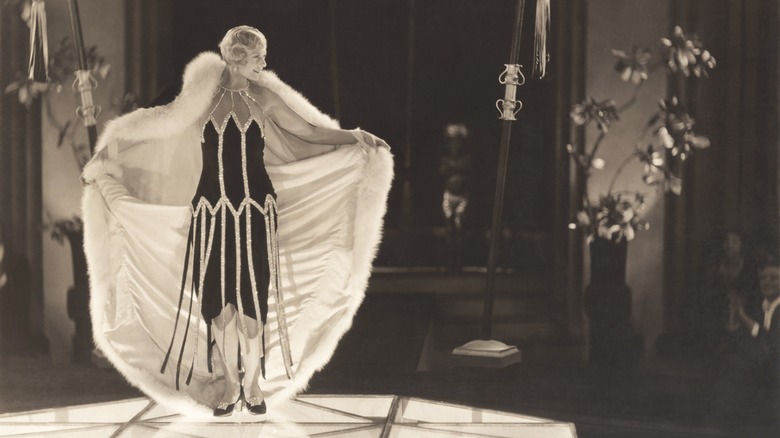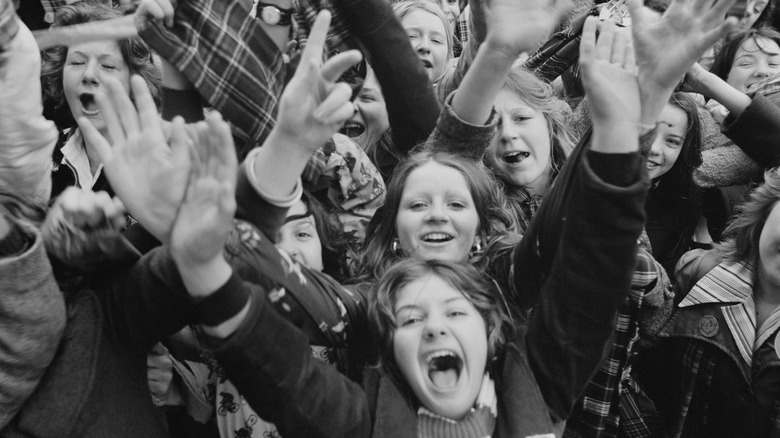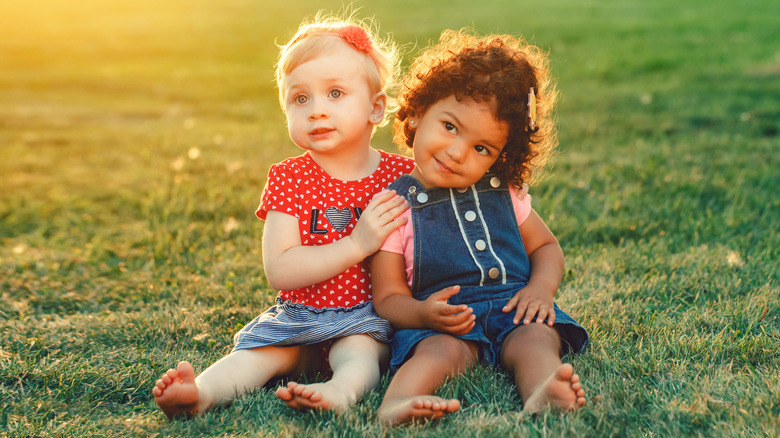What Defines Each Generation?
For decades, the different generations just sort of got along. They tolerated each other, knew they had their differences in life experiences, priorities, and viewpoints, but didn't push it too much — aside from the snarky and inevitable comments over holiday dinners. But that's what wine is for! According to The New York Times, that tolerance came to an end with the coining of, "OK Boomer." It's basically Gen Z's relentless salvo toward the older generations that they blame for things like the destruction of the environment, corporate greed, and inequality, and it was 18-year-old Christopher Mezher who explained: "We're not taking a jab at boomers as a whole — ... it's a jab at ... outdated political figures who try to run our lives."
Everyone's heard that there's not much that can be farther apart on the political, social, and economic spectrums than the opinions of Boomers vs. Gen Z, but ... what does that all mean? How can there be such a massive divide in people separated by just a handful of years (relatively speaking)? We're all looking at the same world, right?
The generation gap is a fascinating thing, and it turns out that those few years can make a huge difference. Let's look at what makes each generation who — and what — they are, and maybe, gain a new understanding of what makes older and younger people tick.
Lost Generation
The precise years that define a generation can get a little iffy in some cases, so while World Atlas gives dates of those born between 1883 and 1900, it's perhaps easier to think of these as the people who came of age during and after World War I. It was the war that defined them, says Family Search. Growing up amid a global conflict that ended with somewhere around 20 million dead and another 20 million wounded, it's not surprising that this generation grew up with a very different outlook from the Victorian-era sensibilities that their parents held.
The term "Lost Generation" comes from one of the era's most famous writers: Gertrude Stein. She wrote, "All of you young people who served in the war ... You are a lost generation." The term is also associated with a group of writers that embody the ideals of their peers. Along with Stein were writers and artists like F. Scott Fitzgerald, Ernest Hemingway, Pablo Picasso, James Joyce, e.e. cummings, and T.S. Eliot.
Stein biographer Diana Souhami describes the era as (via the BBC): "a period that would be totally fractured by World War II. That very wonderful period of freedom and questioning and change." This was the generation of the Roaring Twenties, of a seismic shift in art and literature, and the struggles they faced in the aftermath of a world war, during the devastation of the Spanish flu, and throughout the devastation of the Great Depression.
Greatest/GI Generation
The Greatest Generation was given that particular moniker by Tom Brokaw, who described them (via PEW) as the generation that grew up during the Great Depression, and saw war on an unprecedented scale. These were the men and women who fought in World War II, who Brokaw says "quit school or went from cap and gown directly into uniform."
It makes sense, then, that they're also called the GI Generation, and according to World Atlas, they were typically born between 1901 and 1924, although sometimes, that extends into the late 1920s. They're often seen as, simply put, the actual "greatest" generation, a group of people who sacrificed an almost unthinkable amount to fight in a righteous war to free the world from the possibility of a Hitler-centric future.
The Week says that the image of the Greatest Generation was largely built by their children and grandchildren, and the reality was much more complicated than that. In 2021, researchers from Virginia Tech published a project that collected and digitized surveys that were taken by soldiers in the early 1940s, and they're pretty telling. In addition to complaints about the food and the inevitable red tape of the government and military, they also put a spotlight on other things, like race relations defined using terms that would be 100% off-the-table in the 21st century. It was a glimpse into a generation often lauded for their service and their sacrifice, with a flip side that often went overlooked.
Silent Generation
For a long time, the Silent Generation was defined by who they weren't: Born typically between 1925 and 1945, they were too young to fight on the front lines of World War II, but many were old enough to remember what those long, hard years were like. They're also too old to be Boomers, and were caught in the middle — silent. National Review says that they're often overlooked, because it was this generation that didn't really have a singular rallying point that united them. They never had one of their own become president, and even their war — the Korean War — is the one that most people know little about.
Miami University professor Megan Gerhardt says (via NBC News) that there is something that defines them: They're the generation that just sort of gets on with things, not complaining, not raising much of a fuss, and not asking for anything in return.
Gerhardt was looking at the Silent Generation during the COVID pandemic, when these 75- to 95-year-olds were at the highest risk. Time magazine had once described them as "waiting for the hand of fate to fall on its shoulders, meanwhile working fairly hard and saying almost nothing," even as they sacrificed to build a life and a community for friends, family, and neighbors. It's their silent strength Gerhardt says other generations should remember — at the same time, remembering that just became members of the Silent Generation aren't the type to ask for help, that doesn't mean they don't need it.
Baby Boomers
While the dates given for most generations are a give-or-take-a-bit, the BBC says that's not the case for the Boomer generation. They're defined by the U.S. Census, which found that there was a huge spike in the birth rates post-World War II. That went from 1946 to 1964, and everyone born in that span is considered a Boomer. And there's a lot of them — around 72.5 million, according to Family Search.
To their credit, Boomers have been through a lot. Born to the generations who served in and lived through WWII, they came of age in a time of economic growth, but also, this was the generation that served — or protested — the Vietnam War, saw the Civil Rights Movement first-hand, and lived through the constant levels of fear that was the Cold War.
And, according to writer Bruce Gibney, they also ruined the country. How? Gibney says (via Vox) that by virtue of their birth years, most Boomers grew up without the trauma and struggles that have defined other generations. That resulted in scores of people who were not only just out for themselves, but who planted themselves firmly throughout Washington, D.C., and in other positions of power. In a nutshell: "The Boomers inherited a rich, dynamic country and have gradually bankrupted it ... They've spent virtually all our money and assets on themselves and in the process have left a financial disaster for their children." But — and this is important — that's not to say it's all Boomers.
Generation Jones
The limits of the Boomer generation are defined by census records and a spike in birth rate, says the BBC, but here's the thing: Not all Boomers are the same. According to The New York Times, there's an entirely different name for anyone born in the second half of the Boomer generation. Those who came kicking and screaming into the world between 1954 and 1964/65 are considered Generation Jones. The term came about relatively late in the game, coined in 1999 and chosen for extreme double meanings that help sum up the generation. "Jones" is a pretty common name, but anyone who's trying to keep up with the Joneses wants more and more.
So, who are these young Boomers? While older Boomers were of the age to take advantage of the country's economic heyday, Jonesers were shaped by the painful realization that by the time they were old enough to wade into the adult world, many of the opportunities afforded to their older siblings just a few years prior had vanished.
Bridgeworks explains that while older Boomers were teens in the 1960s, Jonesers were teens in the 1970s. A surging economic environment and a rally to social change had slipped away into economic stress and social conflict — and it shows in those who had to step into adulthood on a very slippery slope, while the older members of their generation skated, sailed, and slalomed their way through the world.
Generation X
Generation X got that moniker, says Family Search, from a stubborn refusal to be defined by anything. Alternate names for the generation of people born between 1965 and 1980 are the Latchkey Generation and the Baby Busters. Both signify important elements of what it was like to grow up as a Gen Xer: Most had 2 working parents and were left to fend for themselves both before and after school, and they're also one of the smallest generations in terms of numbers.
Gen Xers are generally known for their massive independent streak, and when Miami University professor Megan Gerhardt looked at the COVID pandemic in generational terms (via NBC News), it was Gen X that was made for change. While Boomers had a tough time taking the threat seriously and younger people didn't want to give up their lives as social butterflies, Gen Xers collectively donned their sweatpants and crocs, locked their doors, and put their feet up. Gen X was built for self-reliance.
And that's not to say they're lazy: The generation that grew up during Ronald Reagan's presidency and the AIDS epidemic is the one that shaped the world as we know it today — particularly in the tech spheres. According to Forbes, 55% of start-ups are run by Gen Xers, and the most successful include names like Elon Musk. They founded Amazon and Google, Twitter, and the first social networking site, Friendster. In fact, they've shaped the social and technological landscape of the 21st century so completely that The Hartford calls them "the Innovation Generation."
Xennials
For a long time, the generation list went right from Gen X to Millennials. But then, those born right on the cusp started realizing that they were something completely different, and it wasn't their imagination. University of Melbourne sociology professor Dan Woodman talked to USA Today about the Xennials — those born between 1977 and 1983 — and explained the lightning-fast advancement of technology gave this relatively small, micro-generation "a particularly unique experience."
That's defined by technology and age. As children, Xennials used landlines and rotary phones to call friends, then hopped on their bikes and headed out to play ... which was absolutely fine, as long as they were home by the time the street lights came on. That's very Gen X, but then, they cross over into Millennial territory.
Xennials — also called the Oregon Trail Generation — were teens when computers and video games really hit the mainstream, and they were in their 20s when cell phones became something that everyone had. And that's important: While they still remember what it was like to live a largely tech-free daily life, they grew up with things like social media. Woodman explains: "...we hit this technological revolution before we were maybe in that frazzled period of our life with kids and no time to learn anything new. We hit it where we could still adopt, in a selective way, the new technologies."
In short? Xennials were born into the best of both worlds.
Millennials
Millennials have had a rough go of it, and according to Good Housekeeping, there's not even a real consensus on just who they are. While the U.S. Census Bureau says they're those people born between 1982 and 2000, the Pew Research Center says they're born between 1981 and 1996 ... so even that's a little unclear. Either way, there's no denying that the Millennial reputation is one of laziness, an inability to hold down a steady job, living at home with the 'rents, and poor life choices. That's not even a fraction of the truth.
The lives of many Millennials were shaped by a massive economic recession that happened as they were trying to get into the job market and establish themselves. While they're blamed for killing consumerism, economists suggest that's because they never had the opportunity to build wealth — and buy homes — like previous generations. That's true even though Millennials tend to be well-educated and loyal to employers.
And yes, Millennials tend to be defined by the very real trend of living at home with their parents for longer and delaying in starting their own families — if, that is, they ever do. And while that's often chalked up to being lazy and selfish, there's way more at work here. In 2014, the reported net worth of Americans under the age of 35 had fallen by a full third, meaning that the things Millennials are condemned for are a product of the broken system they inherited.
Generation Z
Generation Z was, says the Pew Research Center, called post-Millennials for a long time, before getting their own designation. They're the ones born between 1997 and 2012, and in 2020, they acknowledged that it's really too soon to tell just what kind of generation these young adults are going to grow into. They do know some things, though, and it's pretty dire.
This is the generation that's going to be finding their way in a post-COVID world, and as everyone who lived through COVID knows, there was a lot that changed. Gen Z has already seen family members lose their jobs, take pay cuts, and risk their lives as front-line workers, and at the same time, they've seen countless jobs and opportunities that existed before the pandemic simply vanish.
They're also more diverse than any generation before them, they're likely to be the most well-educated, and with Gen Z, the world has hit a point of no going back: Gen Zers have no memory of a world before smartphones, streaming services, and social media. McKinsey & Company calls them "the first generation of true digital natives," and suggests that with that will come further blurring of the lines between the digital and the off-line world ... if such a thing even continues to exist.
Generation Alpha
While Generation Z is still writing what it means to be one of them, Generation Alpha is still writing their story, too. Given that they're the ones born between 2010 (or 2012) and 2025, it's tough to talk about them in terms of what massive, sweeping changes they're going to bring to the world.
There is a little bit that's known about them: The Annie E. Casey Foundation says that this generation will be more diverse than even Gen Z, and likely more educated as well. They're also more likely to have more adult relationships, as a large number will be raised by single parents, and associate with their parent's college-educated friends from a young age.
They'll also grow up with technology in hand from Day One, and just how that's going to play out won't be fully understood for decades. And there's a massive footnote to this: Before anyone starts blaming Generation Alpha for being screen-obsessed, socially inept trolls, it's worth mentioning that marketing specialists have been developing strategies to target them since before many were even born — with help from their social media-obsessed parents. According to Vox, Kid-focused brands are hoping that the Millennial parents of Gen Alpha are going to be all about raising mini-Millennials. Will they? Only time will tell.










